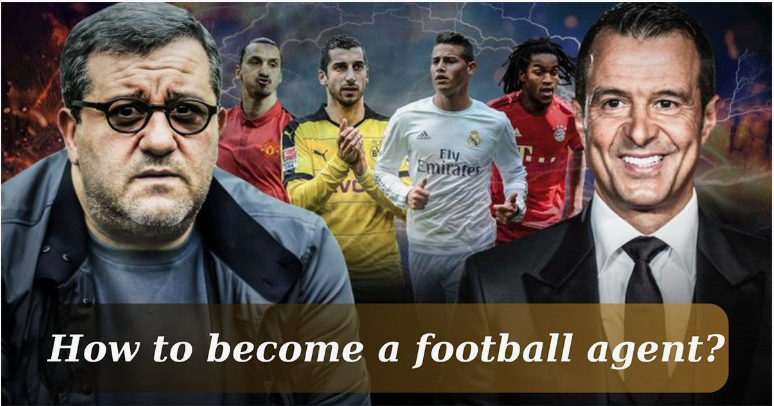How to Become a Football Agent
How to Become a Football Agent, Wembley is a lovely stadium. It’s a lovely stadium to have a meltdown at.
These words sum up the emotions of Lewis Brownhill, brother of Burnley midfielder Josh Brownhill, who is among the 5,000 aspiring agents worldwide preparing for FIFA’s rigorous agent licensing exam.
At 37, Brownhill has had a distinguished career as a chief technician in the RAF, including three tours of Afghanistan over nearly two decades of service. In addition, he works as a scout for Cassius Sports, an agency representing players like Alex Oxlade-Chamberlain and Northern Ireland manager Michael O’Neill.
Reflecting on the exam, Brownhill said:
“I feel more nervous, genuinely, than going to Afghanistan. I set my goal to be an agent. This exam is the next stage of my career, and I’ve put pressure on myself to succeed. The low pass rate only adds to that pressure.”
But how does one actually become a football agent? Is it something anyone can achieve? Let’s explore the journey and the challenges that come with it. What’s Wrong with Manchester City? Unraveling Their Worst Slump in Years
The FIFA Agent Exam: A Gateway to a Dream Career
On a cold November morning, 300 candidates shuffled into the Great Hall at Wembley Stadium, each taking a seat at a classic exam-style desk. In front of them were two pieces of paper, a pen, and the weight of their ambitions.
The FIFA exam comprises 20 multiple-choice questions, covering topics such as sell-on clauses and rules regarding minors. To pass, candidates must answer at least 15 questions correctly—an intimidating 75% pass mark.
The £300 entry fee not only grants candidates the opportunity of a lifetime but also comes with a palpable sense of GCSE-like anxiety. Success could mean access to the glamorous and high-stakes world of professional football, where licensed agents play a pivotal role in shaping players’ careers.
The Role of Football Agents
Globally, there are approximately 7,000 licensed agents, representing players and managing transfers in a world where Premier League clubs alone spent over £400 million on agent fees in 2024. While some agents earn reputations as “super agents” like the late Mino Raiola, most are professionals quietly navigating contracts and negotiations.
The job, however, is not without its critics. Sir Alex Ferguson once famously derided agents, claiming,
“They dominate players’ lives, handling everything from groceries to boot polishing.”
Agents, whether seasoned professionals or family members, are essential in ensuring players’ off-field concerns are managed, enabling them to focus solely on their performance.
Why Reintroduce the Agent Exam?
Between 2015 and 2023, FIFA’s deregulation of the industry allowed anyone without a criminal record to become an agent by merely signing a form and paying a fee. This led to an influx of inexperienced intermediaries, prompting calls for stricter regulation.
The FIFA agent exam, reinstated in 2023, aims to raise the professional and ethical standards of the industry. While critics argue the exam’s content is overly theoretical, it is widely acknowledged as a step towards ensuring agents possess the foundational knowledge needed to navigate the international transfer system.
A Male-Dominated Industry
A striking observation during the Wembley exam was the lack of gender diversity. Less than 10% of the candidates were women, reflecting FIFA’s statistics that only 7% of licensed agents globally are female.
Autumn Brown, a 24-year-old candidate representing Outreach Talent Group, shared her experience:
“Walking into an exam room with so few women is intimidating. But I know my value and won’t let it deter me.”
The need for inclusivity and representation in the industry remains a critical challenge. Five Challenges Ahead for Guardiola and Manchester City
Preparing for the Exam
The FIFA exam is no walk in the park. Candidates have one hour to complete the test, which is open-book, allowing reference to FIFA’s exhaustive 686-page document of regulations. Yet, even with this aid, the questions often catch candidates off guard.
For instance, one candidate shared their surprise at being tested on a foreword written by FIFA President Gianni Infantino. Others found questions on global sanctions and safeguarding especially challenging.
Despite its difficulty, the exam is designed to test knowledge of FIFA’s transfer system, not the day-to-day responsibilities of an agent. This distinction often draws criticism but underscores FIFA’s focus on standardizing the profession.
Family Members as Agents: A Controversial Role
The deregulation period from 2015 to 2023 saw a rise in family members acting as agents. While some parents excel in representing their children, others face criticism for being too emotionally involved.
Andy Lowe, father of Stoke striker Nathan Lowe, shared his perspective:
“A trusted advisor is what every player needs. While I don’t intend to represent my son, understanding the industry helps me guide him and keep his agents accountable.”
The debate continues over whether family members make effective agents, but most agree that professionalism and objectivity are key to success.Erling Haaland Hat-Trick Leads Norway to Nations League Promotion
The Verdict
One week after the exam, candidates receive their results via email. For those who pass, the journey has just begun. As Lewis Brownhill put it,
“Passing the exam is like getting your driver’s license—it doesn’t mean you’re ready for the road.”
A FIFA agent license is only the first step. Building relationships, mastering negotiations, and understanding the nuances of the industry take years of experience.
Despite the challenges, the reintroduction of the FIFA agent exam has raised the bar for aspiring agents, ensuring that those who enter the field are better equipped to navigate the complexities of professional football.

